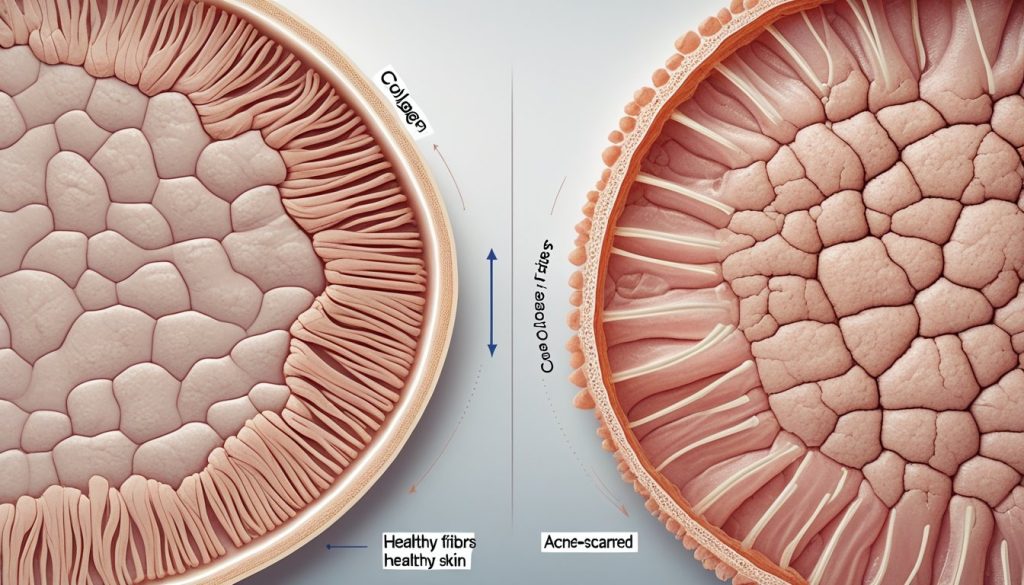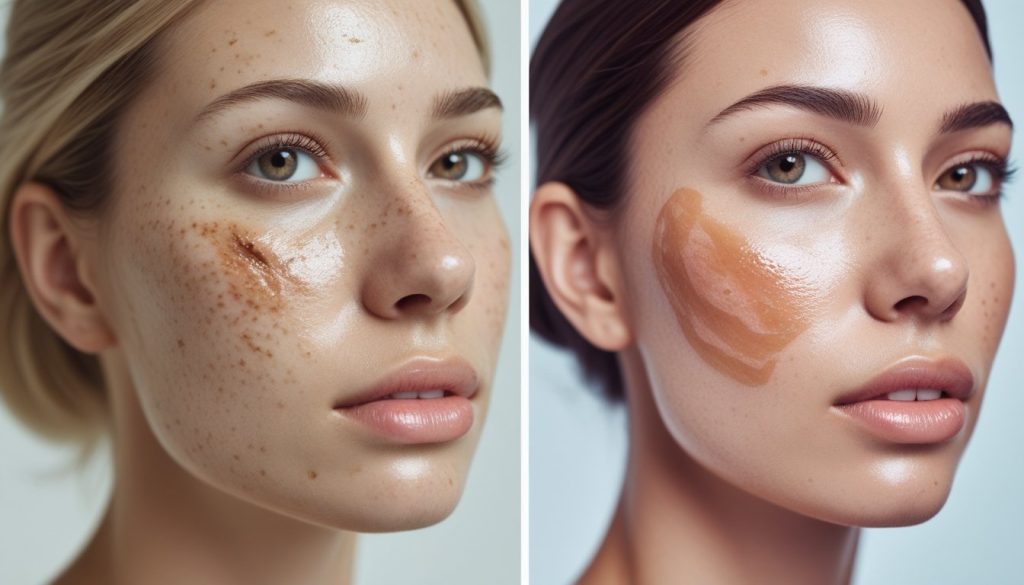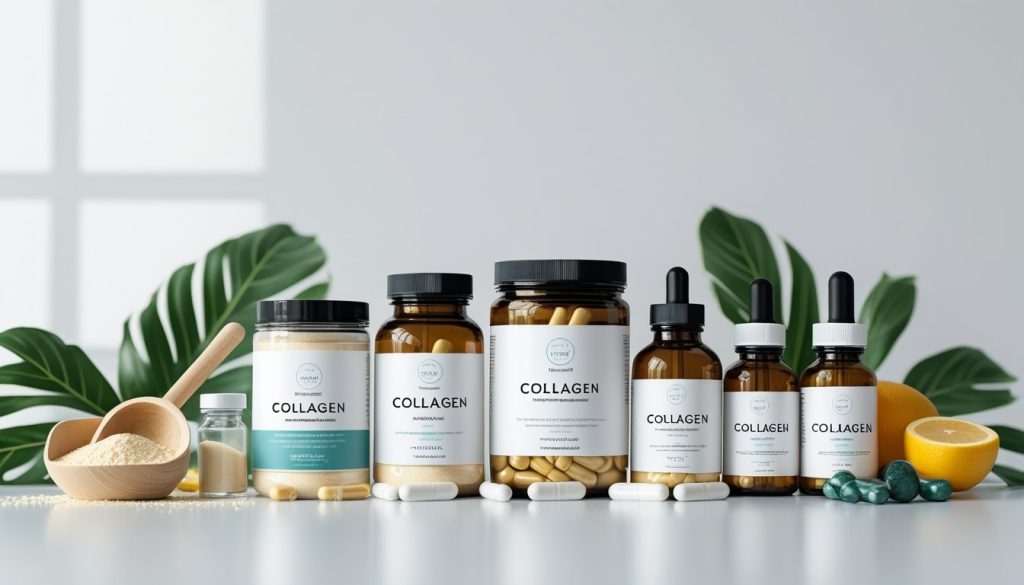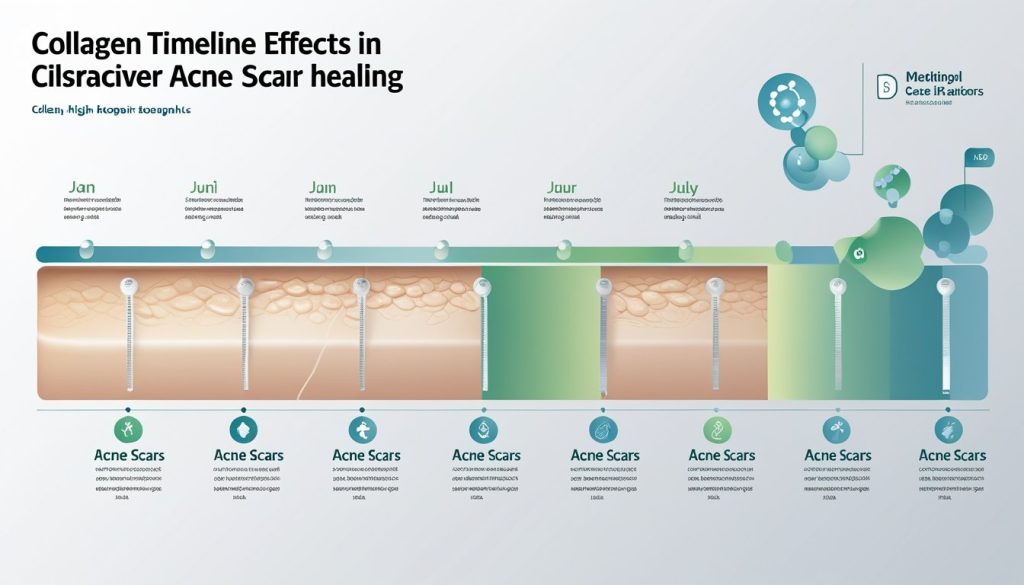Acne scars represent one of the most persistent and emotionally challenging consequences of severe acne breakouts. These indented marks, affecting up to 90% of individuals who experience acne, can significantly impact self-confidence and quality of life13.
While traditional treatments often involve invasive procedures with substantial recovery time, emerging research reveals that Collagen plays a fundamental role in acne scar healing and prevention.
Understanding how this essential protein supports skin recovery can revolutionize your approach to achieving smoother, healthier skin.
The relationship between Collagen and acne scar healing extends far beyond surface-level improvements. This structural protein, which comprises over 80% of the skin's dry mass, serves as the foundation for effective wound healing and tissue regeneration2.
When acne damages the skin's deeper layers, Collagen becomes the key player in restoring skin integrity and minimizing scar formation.
Understanding Acne Scars and Collagen's Role
The Science Behind Acne Scar Formation
Acne scars develop when inflammatory acne lesions penetrate deep into the skin, damaging the follicle wall and surrounding tissue. This damage triggers the body's natural healing response. Still, insufficient or disorganized collagen production during the repair process leads to atrophic scarring—those characteristic indented marks that remain long after the acne has cleared.
The three primary types of atrophic acne scars—icepick, rolling, and boxcar—each result from different patterns of collagen loss and inadequate tissue regeneration. Understanding this connection between collagen deficiency and scar formation provides the foundation for effective treatment strategies.
How Collagen Functions in Skin Health
Collagen serves multiple critical functions in maintaining skin health and facilitating proper wound healing. This fibrous protein provides structural support, maintains skin elasticity, and creates the scaffolding necessary for new tissue formation1. When collagen levels are adequate, the skin can effectively repair damage and minimize scarring.

5 Proven Ways Collagen Aids in Acne Scar Healing
1. Accelerates Wound Healing and Tissue Repair
Collagen plays a crucial role in the wound healing cascade, serving as a key attractant for fibroblasts and keratinocytes—the cells essential for synthesizing new tissue.
During the proliferation phase of healing, Collagen attracts necessary repair cells to the wound site, promoting the development of granulation tissue that fills damaged areas.
The protein also facilitates angiogenesis, the formation of new blood vessels, which are crucial for delivering nutrients to healing tissue. This enhanced blood supply supports the growth of healthy new skin cells and accelerates the overall repair process1.
For individuals with recent acne breakouts, adequate collagen levels can significantly improve healing outcomes and reduce the likelihood of permanent scarring.
2. Strengthens the Skin's Dermal Layer
Collagen supplementation helps strengthen the dermis layer, making it thicker and more elastic, which allows existing scars to stretch and become less visible. This strengthening effect is particularly beneficial for atrophic scars, where tissue loss has created indented areas in the skin surface.
Research indicates that inflammation associated with moderate to severe acne can result in dermal Collagen and fat loss, leading to the characteristic appearance of atrophic scarring4. By replenishing collagen levels through targeted supplementation, individuals can help restore dermal thickness and improve overall skin texture.
3. Provides Anti-Inflammatory Benefits
Acne is fundamentally an inflammatory condition, and Collagen contains glycine, an amino acid with proven anti-inflammatory properties6. This anti-inflammatory effect can help prevent the formation of new acne while supporting the healing of existing lesions.
The anti-inflammatory properties of Collagen are particularly relevant given that keloids and hypertrophic scars result from chronic inflammation in the reticular dermis3.
By reducing systemic inflammation, collagen supplementation may help prevent the formation of raised scars and support more favorable healing outcomes.

4. Enhances Skin Hydration and Barrier Function
Proper skin hydration is crucial for optimal healing and preventing scars. Collagen helps improve skin hydration levels and strengthens the skin barrier, creating an environment more conducive to healing5.
A strong skin barrier also helps protect against bacteria and inflammation, reducing the likelihood of new breakouts.
Well-hydrated skin appears healthier and more radiant, while also being less prone to irritation and redness. This improved skin condition creates a more favorable environment for scar healing and overall skin recovery.
5. Stimulates Natural Collagen Production
Perhaps most importantly, collagen supplementation can stimulate the body's collagen production processes. High-quality marine collagen supplements provide the amino acids necessary for the body to synthesize new collagen fibers, supporting ongoing skin repair and regeneration2.
This stimulation of natural collagen production is particularly beneficial for addressing the age-related decline in collagen synthesis that begins in the mid-20s. By maintaining adequate collagen levels, individuals can support their skin's natural ability to heal and recover from acne damage.
Choosing the Right Collagen for Acne Scar Treatment
Marine vs. Bovine Collagen
The best Collagen for acne scars is fish collagen hydrolysate, taken in a daily dose of at least 2,500 mg.
Marine Collagen is often recommended for individuals with acne-prone skin because it is easily absorbed and tends to cause fewer irritations than bovine collagen5. This form of Collagen has higher bioavailability and typically provides higher doses per daily serving.
Hydrolyzed Collagen Benefits
Hydrolyzed Collagen, also known as collagen peptides, is broken down into smaller particles, making it easier for the body to absorb and potentially less likely to cause skin reactions5. This form of Collagen can more effectively transport collagen peptides to wound sites, encouraging the skin's return to a healthy-looking state.

Professional Treatments That Enhance Collagen Production
Collagen Induction Therapy (Microneedling)
Collagen Induction Therapy, commonly known as microneedling, creates controlled micro-injuries in the skin that trigger the body's natural healing response and boost collagen production12. This treatment is particularly effective for acne scars because it tricks the skin into thinking it has been injured, prompting increased collagen synthesis to repair the perceived damage.
Platelet-Rich Plasma (PRP) Therapy
PRP therapy has shown excellent results when used alone or in combination with other treatments for acne scars. PRP contains growth factors that promote wound healing and accelerate tissue repair, while also stimulating the regeneration of Collagen and elastin. The treatment is safe, minimally invasive, and has limited downtime with negligible risk of allergic reactions.
Realistic Expectations and Timeline
What Collagen Can and Cannot Do
While collagen supplementation cannot technically “break down” or “erase” old, deep-set acne scars, it can prevent the development of new acne and enhance the healing of recent scarring6. For established scars, dermatological treatments like soft tissue fillers, laser resurfacing, and chemical peels remain the most effective options.
However, hydrolyzed Collagen can help heal just-forming scars from recent breakouts by transporting collagen peptides to the wound site and encouraging proper healing6. The key is early intervention and consistent supplementation.
Timeline for Results
Collagen supplementation typically requires several months of consistent use to see noticeable improvements in skin texture and scar appearance. New collagen formation begins within a few months of starting supplementation, gradually filling in scarred areas and improving overall skin smoothness 10.

Maximizing Collagen's Benefits for Acne Scars
Combining Approaches
The most effective approach to treating acne scars involves combining collagen supplementation with other proven therapies. This multimodal approach addresses scars from multiple angles, maximizing the potential for improvement4.
Supporting Lifestyle Factors
A comprehensive approach to skin care includes maintaining a balanced diet rich in collagen-promoting nutrients, using appropriate topical products, and protecting the skin from further damage. These supporting factors enhance the effectiveness of collagen supplementation and promote overall skin health.
Safety Considerations and Side Effects
Collagen supplements are generally well-tolerated, with minimal side effects reported in most users5. However, some individuals may experience mild digestive upset or skin reactions, particularly when first starting supplementation. Choosing high-quality, pure collagen products from reputable manufacturers can minimize the risk of adverse reactions.
It's important to note that while the FDA does not explicitly approve dietary supplements like Collagen before they reach the market, manufacturers are responsible for ensuring their products are safe and accurately labeled. Consulting with a healthcare provider before starting any new supplement regimen is always recommended.
Conclusion
Collagen serves as a powerful ally in the fight against acne scars, providing multiple mechanisms of action that support skin healing and regeneration. From accelerating wound healing and strengthening the dermal layer to providing anti-inflammatory benefits and enhancing skin hydration, Collagen addresses the fundamental processes involved in scar formation and repair.
While collagen supplementation may not eliminate established acne scars, it can significantly improve skin texture, prevent new scar formation, and support overall skin health. The key to success lies in choosing high-quality marine collagen supplements, maintaining consistent use, and combining supplementation with other proven treatment approaches.
For individuals struggling with acne scars, incorporating Collagen into a comprehensive skincare routine offers hope for achieving smoother, healthier skin. With patience and consistency, the transformative power of Collagen can help restore confidence and reveal the radiant complexion that lies beneath.
Ready to explore how amino acids support collagen production and skin healing? Discover the complete guide to amino acids and their role in skin health to maximize your acne scar treatment results.
Frequently Asked Questions
1. How long does it take for Collagen to help with acne scars?
Collagen supplementation typically requires 3-6 months of consistent use to see noticeable improvements in acne scar appearance, as new collagen formation is a gradual process.
2. Can collagen supplements cause acne breakouts?
High-quality collagen supplements are unlikely to cause acne. However, some products with additives or fillers may irritate sensitive skin. Choose pure marine collagen to minimize this risk.
3. What's the best type of Collagen for acne scars?
Marine collagen hydrolysate, in doses of at least 2,500 mg daily, is considered most effective for reducing the appearance of acne scars due to its superior absorption and bioavailability.
4. Should I use topical Collagen or oral supplements for acne scars?
Oral collagen supplements are more effective than topical applications, as collagen molecules are too large to penetrate the skin effectively when applied topically.
5. Can Collagen help with all types of acne scars?
Collagen is most effective for atrophic (indented) scars and can help improve texture, but deep, established scars may require professional treatments for significant improvement.
6. Is it safe to take collagen supplements daily?
Yes, daily collagen supplementation is generally safe for most people, with minimal side effects reported in clinical studies.
7. Can I combine collagen supplements with other acne scar treatments?
Yes, collagen supplementation can be safely combined with professional treatments, such as microneedling, laser therapy, and chemical peels, for enhanced results.
8. Will Collagen help prevent new acne scars from forming?
Yes, adequate collagen levels support proper wound healing, which can help minimize scar formation from new acne lesions.
9. How much Collagen should I take for acne scars?
The recommended dose is at least 2,500 mg of hydrolyzed marine Collagen daily, though some individuals may benefit from higher doses up to 10 grams.
10. Are there any foods that can boost collagen production for acne scars?
Yes, foods rich in vitamin C, amino acids, and antioxidants can support natural collagen production, including citrus fruits, bone broth, fish, and leafy greens.

